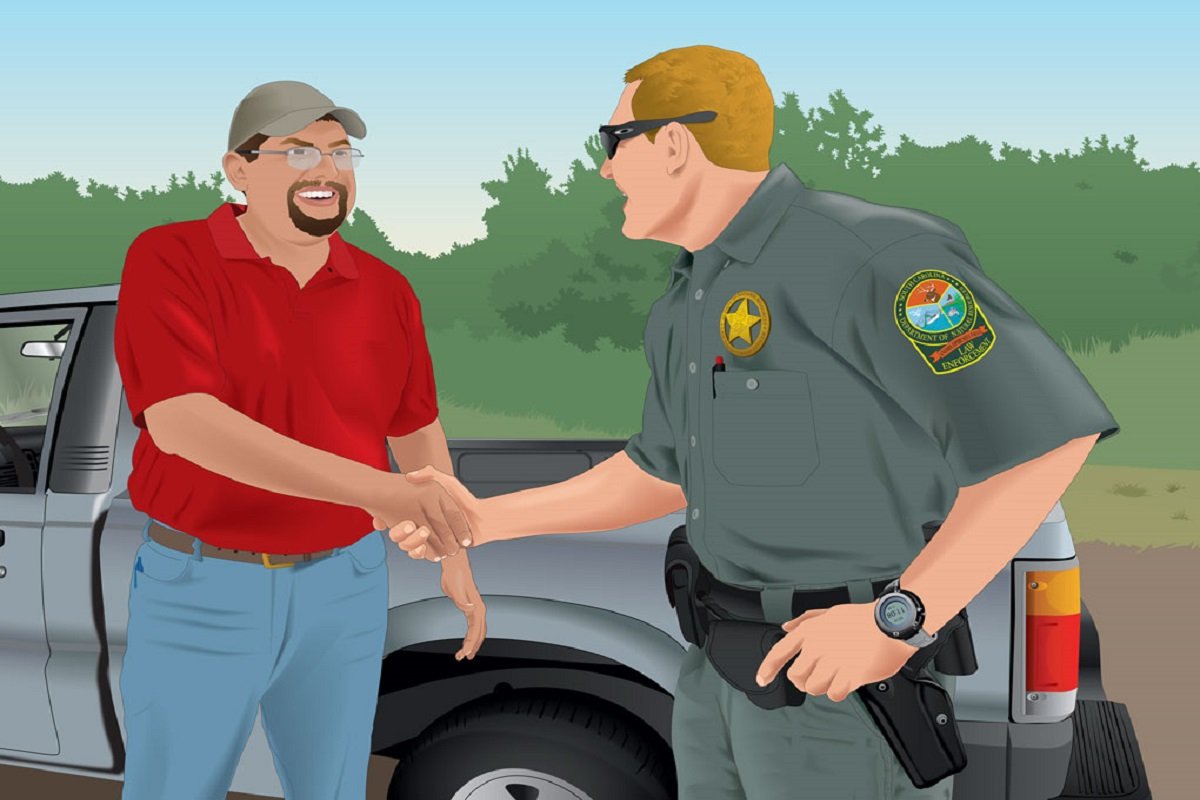Why were Hunting Laws Passed?

Laws about hunting have been around since the beginning of time. In the year 1315, King Edward II of England made the first law about hunting that we know of. The Forest Charter was a law that said hunters could only hunt in certain areas and had to get a license from the king. In this article, you can learn about why were hunting laws passed.
The main goal of these early hunting laws was to keep the game alive for the nobility and stop people from hunting too much. In later centuries, when there were more games, these rules were loosened and eventually got rid of.
With the rise of modern wildlife conservation movements in the late 1800s and early 1900s, hunting laws were put back in place in many places to protect wildlife populations that were getting smaller. Today, hunting laws in different countries are different, but they all have the same goal: to keep people from hunting too much and to protect wildlife.
Table of Contents
Why Are Hunting Regulations Passed to Appease the Anti-Hunting Population?
Laws about hunting were made to help make sure that game animals will be around for future generations. Also, hunting laws were made to keep animals from going extinct and to make sure hunters hunted in an ethical way by following the rules.
Game populations can be managed and kept at sustainable levels so that there is enough game for everyone by setting rules about hunting. There were no rules or laws when hunting first became popular. This caused a lot of animals to be killed until they went extinct.
Also, if there were no hunting laws, hunters could easily steal animals or hunt when it was not the right time.
What Was The Primary Reason for Hunting Laws?
In most states, the right answer was to protect wildlife for the sake of future generations. But it was more about protecting animal populations than saving them for future generations.
Now, if you want to hunt any species, you may need to know where to find the rules and regulations. To find hunting rules, places to hunt, and more information about a certain species,
- Publications from the government.
- Websites for wildlife agencies.
- Access guides or books for hunting
- Mapping software and employees of the Agency.
Other hunter Ed questions can be things such as:
Why Were the Hunting Laws Passed? Smart Tips for the Newbie
Hunting laws tell you how you can go after and kill a certain kind of animal for food or to keep it from having too many babies. Still, many people don’t know why these hunting laws were put in place.
Still, they are good hunters and have had the best adventures. So why did they make the hunting laws? There are a few reasons for this. I’m going to learn more about these reasons so I can understand them better.
Read what I’ve written to make sure you understand everything. First, let’s take a look at why hunting laws were made.
Conservation of Wildlife
The main reason hunting laws were made was to help protect wildlife for the benefit of both people living now and those who will come after them. The state can control how hunting is done and how many animals are killed so that no species goes extinct.
Protection of others
Laws about hunting were made so that hunters wouldn’t kill or hurt other people. The goal of these laws is to stop hunters from taking deer and other animals without a good reason. By putting limits on how many animals can be hunted, these laws help protect the animals’ homes and keep their populations healthy.
Allows for Multiplication
In response to this, wildlife management laws were made so that the animals could continue to thrive. This was done by setting up specific hunting seasons and making it illegal for hunters to kill animals when they are nesting or having babies.
Responsible Game Hunting
People have been hunting for thousands of years. When hunters take steps to make sure the animals they are hunting are not threatened or in danger, this is called “responsible game hunting.” Also, hunters must follow certain rules to keep themselves and the animals they are hunting safely.
Discourage Illegal Hunting
Also, the lack of hunting laws has made it harder for people to go hunting illegally. So, people who hunt illegally in order to sell the skin or other animal parts for money can be charged. Several animals that are protected by the Endangered Species Act have become much more common since these laws were passed. This has given these animals a new chance at survival.
In this area, hunting laws have been very important in making sure that animal populations have come back a lot.
Fair chase Of Hunting Laws
At first, hunting laws were made so that game animal wouldn’t be hunted in an unfair way. Most of the time, these laws say that you can’t use baited traps, catch game by surprise, or hunt during closed seasons.
Limiting Hunting Methods
Another reason laws were made about hunting was to limit the ways and tools that could be used. Without these rules, some people might have done things that were harmful or destructive. Today, hunters can only use certain kinds of guns. You can also shoot with bows and arrows. Chemicals can’t be used in any way. Because of these choices, the game and the environment are safe.
Fair distribution Of Hunting Laws
Laws about hunting were made for many reasons. Some people think that hunting laws were made to help protect wildlife, while others think that hunting laws were made to help feed people. It’s also possible that laws about hunting were made to help keep the population in check.
Setting “Bag” Limits
More importantly, hunting laws have limited the number of animals someone can hunt at one time. This is the same as hunting in a responsible way, and it keeps people from taking more than they need. In turn, this cuts down on hunting that isn’t necessary and stops food from going to waste. You can’t just hunt for no reason.
Why Must Hunting Be Regulated?
There are a lot of reasons why hunting needs rules. As we’ve already said, one of the main reasons is to stop overhunting and keep the number of animals at a healthy level.
The number of nonmigratory game species is kept in check by putting limits on hunting. If there were no rules about hunting, these populations could be wiped out, which would cause ecological imbalances.
For example, the number of deer can quickly get out of hand and hurt crops or forests. By putting limits on deer hunting, we can help keep their numbers in check and stop too much damage from happening.
When Did Hunting Become Regulate?
Back in the 1800s, the first rules were put in place. Since then, hunting licenses have come to represent a lot of what the issue is about. Many hunters take online courses as part of this.
You can find many more benefits of hunting laws than were initially set out:
- To keep wildlife alive so that future generations can enjoy it.
- Laws were made to help wildlife thrive by setting hunting seasons to limit the number of animals killed and to avoid nesting and mating times.
- Putting limits on how and what hunters can use.
- Setting “bag” limits.
- To make sure the laws are followed, check stations and game tags are set up.
Besides ensuring the availability of games for the future, these laws:
- Set up safety rules for hunting to protect both hunters and people who don’t hunt.
- Give all hunters the same chance, no matter what they use.
- Get money for wildlife programs by charging for licenses.
The Benefits of Hunting
Hunting is good for people, animals, and the environment in many ways. Humans benefit most from hunting because it gives them food. Hunting can also be a good way to make money for people who hunt for food and for those who take part in hunting tournaments.
Hunting can also bring in food for the pet trade, which can help poor families make ends meet. Rich people can also get food for their table by hunting. The main benefit of hunting for animals is that it gives them food. Pet animals can also benefit from hunting because it gives them a chance to train and move around. When you hunt, you can also get food for the pet trade, which can help you make money.
Hunting Laws Stop Us From Reaching the Tipping Point
As species have died out over the history of our planet, the balance of that regional (or even global) ecosystem has been thrown off.
Resources disappear. Species change in order to live. All the remaining life forms will eventually change in the ways they need to in order to keep living together. The ecosystem’s balance is restored.
For instance, if bees suddenly died out, they wouldn’t be able to pollinate the flowers where they normally gather food. If the flowers don’t get pollinated, the flowers can start to die.
Those flowers would die, which would hurt the ecosystem even more. This effect would keep spreading to more and more species, forcing all of them to change as needed until the balance is back to normal.
If any species went extinct because hunting was not controlled, the same thing would happen. The same thing can happen if the population of one species grows to the point where it threatens the survival of other species.
How hunting laws have changed over the years?
In the year 1315, King Edward II of England made the first law about hunting that we know of. The Forest Charter was a law that said hunters could only hunt in certain areas and had to get a license from the king. The main goal of these early hunting laws was to keep the game alive for the nobility and stop people from hunting too much. In later centuries, when there were more games, these rules were loosened and eventually got rid of.
With the rise of modern wildlife conservation movements in the late 1800s and early 1900s, hunting laws were put back in place in many places to protect wildlife populations that were getting smaller. Today, hunting laws are different from country to country, but they all have the same goal: to stop people from killing too many animals and to protect wildlife.
How Can You Show Respect for Non-Hunters?
There are a few things you can do in the field to show respect for people who don’t hunt. The first is to move your game animals quietly. For example, try not to show them off on the side of the road.
Another thing you can do is hide your guns. Even though it’s important to hunt safely and legally, you shouldn’t offend or scare people who don’t hunt.
If you follow these simple tips, you can help make sure everyone has a safe and fun time outside.
What Are the Penalties for Violating Hunting Laws?
The purpose of hunting laws is to protect wildlife and make sure that hunters follow safety rules when they go hunting. Depending on how bad the violation is, the punishment for breaking hunting laws can range from a fine to jail time.
Why Were Hunting Regulations Passed? The first hunting laws in 1607?
As soon as the Thirteen British Colonies got their independence in 1607, the first hunting rules were made.
Why did laws about hunting get passed in 1607? In the 1600s, overhunting meant that other families or colonies could run out of food and not have enough important resources, like fur, to make warm clothes. So, making hunting rules helped make sure people had some of the most important things they needed to live.
The rules for hunting looked very different from what we have now. The very first hunting licenses didn’t come out until the 1800s. The rules have changed over time, especially in the last ten years. They are now so important that they are a key part of global efforts like cutting our carbon footprint.
Why do some people oppose hunting laws?
Not everyone agrees that there should be rules about hunting. Some people say that the right to hunt is a basic right that shouldn’t be taken away. Some people think that hunting laws don’t work and hurt more than they help.
People who don’t like hunting laws often say that they hurt poor and rural areas more than other places. People in these places often depend on hunting for food and money, and strict hunting rules can make it hard for them to make a living.
Critics also say that hunting laws are often used to oppress and control native people. In many parts of the world, it is against the law for native people to hunt on their own land. This has caused fights and sometimes violence.
How Do Game Conservation Laws Affect Hunters?
Depending on how well they are enforced, game conservation laws can be good or bad for hunters. If laws about game conservation are followed, they can help make sure there are enough healthy animals to hunt.
But let’s say that laws about game conservation are not well followed. In that case, it can cause the number of animals hunters can hunt to go down and the quality of hunting to go down.
Hunters need to know the game conservation laws in their state or province and make sure they follow all of the rules. Doing so can help make sure that there will always be a healthy number of animals to hunt, both now and in the future.
Conclusion
Laws about hunting have been around for a very long time, but why? Why do they exist? Even though hunting laws are different from one country to the next, there are many reasons why they were made and why they are still important today. In this blog post, we’ll talk about some of the reasons why hunting laws were made and passed. If you want to know more about hunting rules and why they were made, please read the whole guide!
Frequently Asked Questions (FAQ) Why were Hunting Laws Passed?
Where Can You Find the Hunting Regulations for the Area You Plan to Hunt?
Contacting the local wildlife management agency is the best way to find out what the rules are for hunting in the area where you want to hunt.
What Type of Information Would You Find in a Hunting Regulations Publication?
Some of the things you might find in a hunting regulations book are the types of animals that can be hunted, the times of the year when hunting is allowed, the bag limits for each species, and any other special rules that may be in place.
Can Anyone Hunt on Private Property?
Most of the time, yes. But there are some exceptions, like if the property has signs that say hunting is not allowed.
What Is One Way to Find the Rules and Regulations for the Specific Species You Plan to Hunt?
Each state has a hunting regulations book that tells you how to hunt certain animals and what the rules are. You can also find this information on the website of the state agency in charge of managing wildlife.
How Is Hunting Regulated in the US?
State and federal agencies, as well as people who own their own land, have rules about hunting.
What Do Hunter’s Ethics Preserve?
The way hunters act helps keep our natural resources safe. Hunters help make sure that wildlife populations will be around for future generations to enjoy when they follow fair chase rules and hunt in an ethical way.
Which Agency Is Responsible for Managing Florida’s Hunting Laws and Regulations?
The FWC is in charge of Florida’s fish and wildlife, including the rules and laws about hunting.
All hunting in Florida has to follow state and federal laws. The FWC makes sure that these laws are followed to protect the state’s natural resources and give Florida residents and visitors hunting licenses that are safe and fun.
Read more:
Where Does Dog The Bounty Hunter Live?





